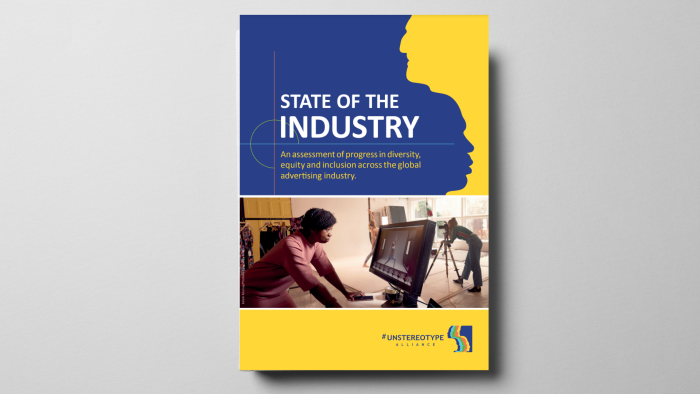Unstereotype Alliance 'State of the Industry' report 2021
Global action platform report identifies key goals and recommendations for the marketing industry to improve diversity and inclusion.
Share this post

On 26 May 2021, Unstereotype Alliance, a global action platform convened by UN Women to eradicate harmful stereotypes from advertising and media content and leverage the industry as a force for good, released their “State of the Industry” report. This timely publication comes one year on from the June 2020 call-to-action from World Federation of Advertisers (WFA) CEO, Stephan Loerke, and the Executive Director of UN Women and Chair of the Unstereotype Alliance, Dr Phumzile Mlambo-Ngcuka.
Key goals and recommendations:
The report identifies three key goals and ensuing recommendations for the marketing industry to improve diversity and inclusion:
1. Fostering workplace equality — Transforming pledges and commitments to action via;
- Pinpointing gaps in representation via the improvement of available metrics, including enhancing the collection of disaggregated data.
- Improving diversity and inclusion within recruitment, retention and promotion by adopting ambitious quotas and targets, backed by published monitoring mechanisms, and continuous tracking at a global-level to identify the most impactful efforts.
- Developing an inclusive workforce via the establishment of pay parity initiatives and Employee Resource Groups (ERG) in tandem with line manager training.
2. Achieving unstereotyped advertising
Accelerating the pace of change through:
- Recognising that progressivity in marketing extends beyond gender alone.
- Providing accountability via continuous benchmarking, tracking and reporting.
- Ensuring diversity in advertising from creation to casting through the fostering of partnerships with diverse organisations, the pursuit of feedback from under-represented individuals, the obtainment of goods and services from diverse suppliers, and the adoption of monitoring tools to track efforts.
3. Empowering public action against stereotypes – Taking advantage of increased consumer awareness as a force for progressiveness by:
- Ditching inauthentic platitudes in favour of concrete actions including donations, awareness raising and transparency in the reporting of initiatives taken.
- Removing harmful branding in a timely manner, acknowledging mistakes and shortfalls at a senior level, and documenting the actions taken.
Opportunities and challenges:
The report’s principal message is that the pursuit of the aforementioned goals for the marketing industry not only presents a strong ethical rationale, but also has a clear business imperative. Brands will ultimately garner the trust and support of consumers when they ensure all content is free from stereotypes, increase diversity and inclusion in house, and where possible, support local communities However, whilst efforts to improve diversity, equity and inclusion were acknowledged, it finds there is still a disconnect between pledges and action. Concurrently, it states that even if progress throughout the Covid-19 crisis has been underwhelming, there is little appetite to return to the pre-pandemic climate:
- Whilst the report cites abundant literature demonstrating that diversity in the workforce can enhance decision making and business metrics, it contrasts this with the sobering fact that 2020 data from the Association of National Advertisers (ANA) members shows that individuals with ethnicities other than White make up only 26% of general membership, 12% of CMO positions, and 27% of senior leadership positions.
- According to the 2020 Unstereotype Metric Report, only 22% of adverts studied featured a mixture of individuals with different ethnic origins and skin colours, and 5% featured individuals from the LGBTIQ+ community, yet findings from the 2021 Ipsos’ Global Advisor Platform study state that 31% of respondents feel more positive towards companies that include representation from a wide range of backgrounds in adverts, whilst a WARC study claims the use of unstereotyped occupational gender portrayals in advertising reflects brand effort and shapes consumers’ positive perceptions of the product itself, with an initiative by Unilever leading to a 28% increase in purchase intent.
- Whilst a global Salesforce study cites that 71% of respondents indicated that they pay more attention to a company’s values in 2020 than in 2019, and 75% state that a vendor’s ethics increasingly factor into their purchasing decisions, there is a growing distaste for inauthenticity of action, with, for example, 34% of consumers surveyed across the US believing that brands were hijacking the Black Lives Matter movement for their own gain.
About the Unstereotype Alliance
The Unstereotype Alliance was founded in 2017 to champion the belief that advertisers and agencies have a unique ability and responsibility to challenge harmful stereotypes and to foster diversity through the content they produce with progressive portrayals of all people.


